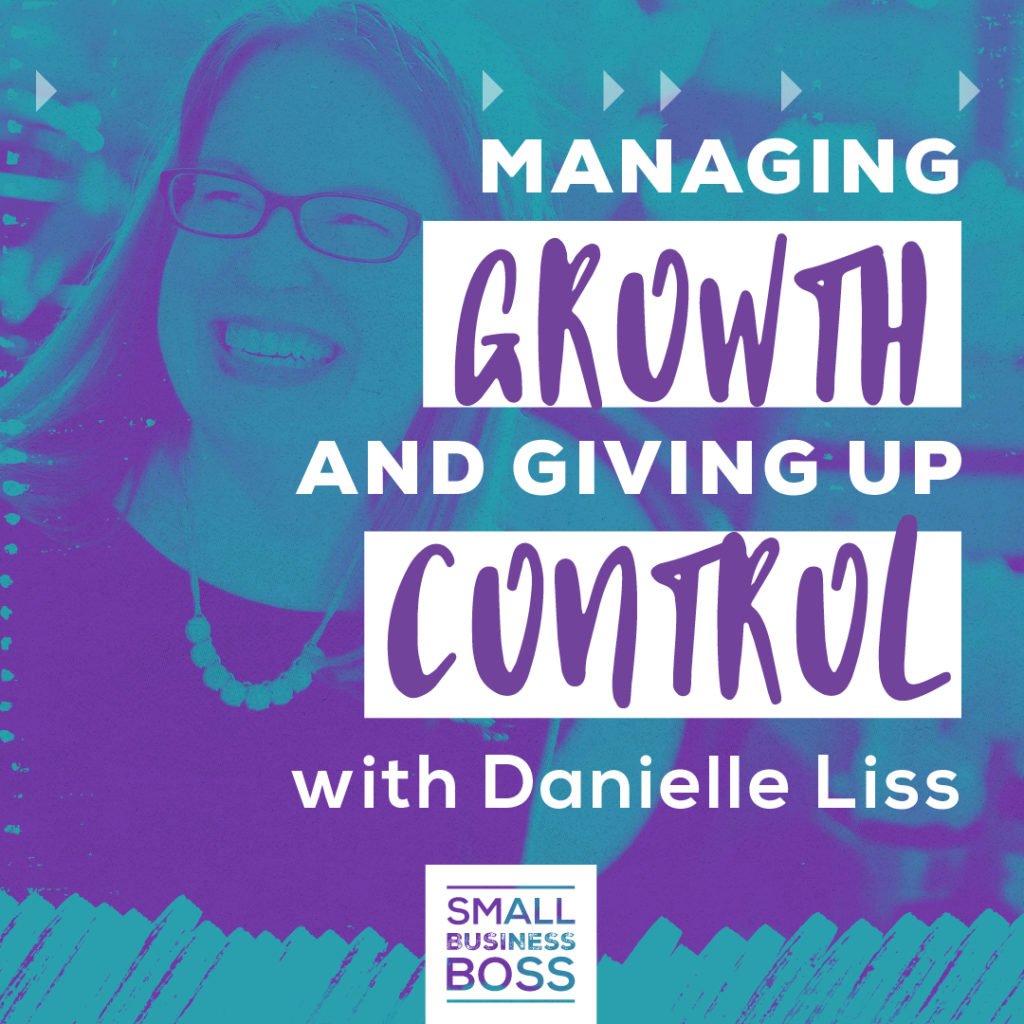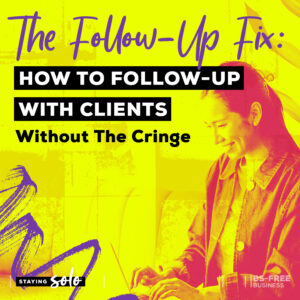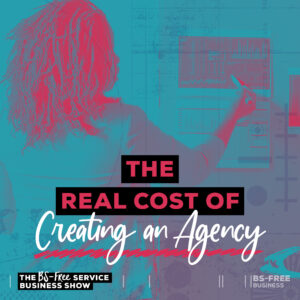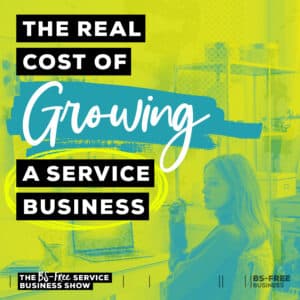
Search the site:
Episode 117: Managing Growth and Giving Up Control with Danielle Liss
What happens when you’re ready to grow, but you’re kind of Type A and giving up control feels like too much work? Or you’re growing so fast that you don’t have time to hire? That’s exactly what our guest in this episode, Danielle Liss from Hashtag Legal, was up against, and she’s sharing how she’s managing growth with her partner Jamie Lieberman, and most of all, how she’s giving up control.
Today on the show, we’re kicking off a new series of interviews where I’m taking you behind-the-scenes of different service businesses. My goal for this series is to show you what it’s REALLY like, so I’ll be talking to bosses at different stages in their business and getting real about the challenges, lessons and more.
We’re kicking off this series with Danielle Liss, who’s a partner at Hashtag Legal, and I must admit, my personal book concierge. So, consider yourself warned; there may be some book talk in this episode. Danielle speaks candidly about managing growth, hiring, giving up control when you’re Type A and what you MUST handle on the legal side as a services boss.
Danielle’s bio
Named one of the top 100 lawyers in Las Vegas, Danielle is a partner at Hashtag Legal, a law firm focused on legal services for small business owners in a digital world. She is also a partner at Businessese, which offers legal templates and business tools and co-host of the Businessese Influencer Marketing Podcast.
How do you make money?
- My partner and I have two businesses.
- We have one that is Businessese, which offers templates and courses for people in the influencer marketing space, some digital marketers as well, and that is to help people with the legal side of their business, because a lot of times, people are really passionate about the creative side but not so much about the business-management side.
- Our primary business is Hashtag Legal, which is a law firm that is aimed at the needs of digital entrepreneurs. We work with a lot of small business owners who are in the digital space.
What kinds of things would I come to your firm for?
- There are a few major practice areas that we cover. We do a lot of entity formations, so that’s for people who are relatively early on and not sure of the best structure for their business is.
- My favorite practice area is contracts. I love contract law and helping people come up with client contracts.
- We also do a good amount of FTC work because we do a lot in the influencer space.
- We do intellectual property and website policies, and for anyone who saw all the notices about GDPR, we did a whole lot of things GDPR-related in the month of May.
How did you start your business? You started with products and realized services are pretty profitable too.
- Jamie and I met at a conference, and we were both speaking at a roundtable and no one came to the roundtable so that meant we really had the chance to get to know each other.
- We had both been sitting on a really similar idea, which was to offer legal contract templates for bloggers because we were at a conference for bloggers. We were like, let’s explore this more; I’m not a very impulsive person, which I think you know, so it’s a little surprising that I would be like, yeah, let’s do this. But we decided to do it, and that’s how Businesses was born.
- We both had said that maybe we should offer some legal services just to keep our feet wet, but we really thought people would be all for DIY and buying our templates.
- What we found very quickly is that people did not want to DIY their legal.
I think it makes a lot of sense in terms of, as much as you can customize a contract or something else, I think everyone wants that piece of mind, especially when you’re a creative, that you’re covered.
- I think it’s really important, and it’s funny to me because I really thought everybody would be like: “Why would I want to pay a lawyer to do this; I can just do it myself.
- Then I realized so many people are like: “I just don’t want to touch this side of my business. It’s not what I’m passionate about.”
- As our business has grown, and I realized the sheer joy that comes from delegation.
- The whole idea of staying in your zone of genius — for a lot of people, this isn’t theirs — we’re very happy to help people with this side.
As someone who’s talked to Danielle on the Small Business Boss trademark, I have to tell you, she’s tenacious so you want her and Jamie in your corner.
What do you think is one of the most challenging parts of offering services?
- For us, I think the most challenging part has been growth because as we’ve grown, we’ve tried to keep the same systems in place, and we hired too slowly,
- I wish we had hired somebody faster to manage the business, and I also wish that we had found some better systems for us. We are currently Dubsado users and that’s made a big difference. It was a way of combining and really refining in a way that allowed for growth instead of scrambling.
- What is always comes down to for me is that I want to be proactive rather than reactive. Unfortunately, I think a lot of the time, we were reacting to things rather than being able to proactively plan.
I think a lot of time when people think they need a team member, they’re actually premature. So, why do you think you guys really held back for so long?
- I think, part of it, was how busy we were, that it was a bit of a daunting task to think about where do you then find the time to find a person, interview people, do all the things that are required as part of the hiring process and then train somebody. You’re usually not going to have somebody who can just come right out of the gate and nail everything. You’ve got to spend time with them so they learn your company culture.
- For me, personally, this wasn’t necessarily Jamie’s issue to deal with, but it definitely was for mine; I’m a complete control freak. The idea of giving up certain things I had control of made me extremely nervous.
- One of the things we needed the most help with was managing incoming leads. The idea of giving that to a stranger — which could truly start to impact our bottom line — that was really one of those moments where I was like, this is hard, but now I’m so glad that we did it because the difference it has made in just in the type of capacity that we now have available to do more client work, it’s astounding to me.
So, there has been a lot of hiring in 2018, but I’m really curious about who did you hand off the lead management to, and how did you do that because I think that is such a well-founded fear?
- We found an OBM, and we did this during our slower period (when we weren’t traveling as much) in Q4 last year, and we put up a job description, and we reached out to our networks primarily, which was, for both of us, Facebook.
- For our hiring, we had hoops to jump thru, we did tests, we did tasks, all before they even got to a phone interview. We considered all of those as the interview process. It made such a difference.
- I was handling a lot of the operations, so we needed to find somebody who has that operations mentality, somebody who can create processes and systems and take those over. The person also had to have a strong enough personality to not let me take it over again.
Whether it’s your first hire or your fifth hire, you’re not just hiring for skill; you need to hire for personality and that fit with your corporate culture.
- 100%! We’re not your average law firm. We’re 100% virtual, we are not at all what you would think of when you think of a stock photo of a lawyer. That’s just not us.
- It was important to us to find people who understood how we do business and how we want to be perceived as a firm.
Switching gears a little bit, how do you find clients, and how do your clients come to you? Where do they mostly come from?
- We do a lot of in-person networking at conferences, and we have a lot of people who hear us speak on podcasts and various places.
- But the biggest source for us has been word-of-mouth.
- It’s a very small niche, and I think that that’s helped. People will say, “Who’s a lawyer who works with this kind of thing?” and we are often top of mind for people. That’s been really important to us.
With word-of-mouth and referrals, you guys do approach legal differently. You make a point of making sure your clients understand and they don’t feel dumb about the questions. I have hired several professional service providers where I just feel really dumb. As a professional, I’m quite smart; I don’t want to feel dumb!
- That’s one of the biggest pieces of feedback that we got from people early on when they came to us. They went to their lawyer and the lawyer basically treated them as a joke more or less.
- It’s really important to us that our clients know we view them as strong small business owners, not just as an influencer. We don’t view your business as a fluke. You’re doing something amazing, and we view ourselves as a partner on that journey where we are helping them grow and scale.
- We are not there to just churn bills and be someone you can’t talk to. We really do want them to feel like they have a partner on their business journey.
You’re a lawyer, so I need to ask this question: What do you think service-based bosses are really overlooking in their legal or just dipping their toe in and thinking what do they need to deal with first?
- I honestly think this comes down to what I said our mindset was: the proactive vs reactive.
- We tend to ignore legal until there’s a problem. I like to encourage people not to do that.
- Find a lawyer that you like. I know that sounds silly, but it’s really what you just talked about. Find that person you can actually have a conversation with that doesn’t make you feel dumb, that makes you feel they’re there to help you grow, and ask them all the things.
- Do a strategy session and say, “Here’s where I am. What do you recommend are the next things I do?”
- The things I typically recommend are to make sure you have your entity where your entity needs to be. Sometimes that’s a collaboration between your lawyer and your CPA, to tell you what makes sense both from a liability perspective but also from a tax perspective.
- You also need to make sure your client contracts buttoned-up. That’s critical because that’s the number one place things go wrong.
- If you’ve got a strong client contract, then I think also, it gives you more confidence to be able to have those conversations because it’s in writing. They’re there to protect the entire relationship — not something that’s just one-sided. It’s something that’s there for both of you to know what’s happening.
One of the things you’ve brought up a few times is the idea of proactive vs reactive. One of the things I think that must be so interesting for both you and Jamie is that you can’t always predict when something is going to happen in someone’s business where they’re in reaction mode. How do you guys handle that in terms of a client calls you and is like, “I have this emergency.” Obviously, you have your day planned already.
- Sometimes, it happens. I think you just have to be able to roll with that a little bit. It’s one of those things where sometimes things that seem like they have to be handled immediately, don’t always have to be.
- Our clients need to us to walk thru the steps of what’s happening and let’s talk about what we need to do next. It may not be nearly as bad.
- But when you get something like, “I got a Cease and Desist letter or something where they have a client that’s freaking out about something, we do try to make sure we have some time available in our day so we can handle just type of thing.
- No day is 100% planned because you never know what’s going to show up in your inbox on a certain day, so we do spend some of the time reacting to the things that come in.
- There’s always going to be those things every now and then, and we want to make sure we are available to help when it does happen.
What do you wish you knew sooner about working with clients?
- One of the biggest things was setting boundaries so that people don’t expect the immediate reply. I think that that’s really important.
- You don’t want people to think they can email you all weekend and get responses if that’s not how you do your business.
- The onboarding and offboarding processes are critical so that your client feels there is a sense of closure in whatever project it is.
- We make sure they have a wrap-up email, which you don’t always have with a lawyer. We want to make sure they feel all their questions are answered if there’s work we need to follow up on.
- Also, following up with people in the future to see if they need a check-up or strategy session or anything we can help with. It’s amazing how many times people say yes, they do.
The Recap
Didn’t Danielle have so many things that were relatable — especially if you’re a little bit, let’s say Type A?
I loved how Danielle shared that they waited too long to hire and it caused a fair bit of stress. (Great lesson!)
I also really liked that she was very clear about what you did need with legal and the whole part of her story where she and Jamie started with one very different idea in mind and realized that services were something people actually wanted.
There’s such a strong message in there for knowing your audience and being willing to pivot as you get that intelligence.
Links for this episode:
- Hashtag Legal
- Hashtag Legal Services
- Businessese
- Influencer Marketing Podcast
- Sign up for legal tips and tricks

I’m Maggie Patterson (she/her), and services businesses are my business.
I have 20+ years of experience with client services, am a consultant for agency owners, creatives, and consultants, and vocal advocate for humane business practices rooted in empathy, respect, and trust.
Read or Listen to the Latest
For Solo Business Owners

Growing a solo service business is tough.
It’s even harder when you’re bombarded with BS advice that steers you away from your values and why you started your business in the first place.
This is the podcast for solo creatives and consultants who want to remain as a team of one and have zero interest in the hustle and grind of typical business teachings.
Subscribe now and never miss an episode.
For Micro Agency Owners
Most podcasts for agency owners obsess over revenue growth as the ultimate success metric.

But here’s the truth: not everyone wants to make millions. Your goal might be to build a sustainable business that lets you have a life and doesn’t run you into the ground.
Join me as I spill my shameless confessions and share everything I’ve learned about building a micro agency that skips the BS of tired and typical agency teachings.
Follow Now on All Major Podcast Platforms








